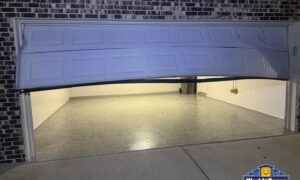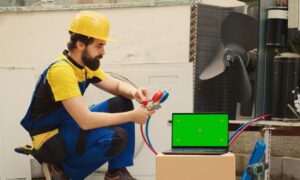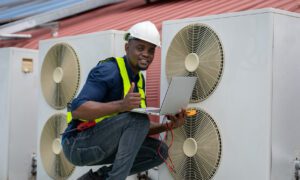Air conditioning systems are essential for maintaining a comfortable indoor environment, especially during hot summer months. However, if not properly maintained, your air conditioning unit may experience problems, leading to decreased performance, higher energy bills, or even complete system failure. To prevent a costly air conditioning repair in West Palm Beach, it’s crucial to identify and address system issues early on.
Here’s a comprehensive guide on how to spot and fix common air conditioning problems before they escalate.
- Inspect and clean your air filters regularly.
Clogged or dirty air filters can significantly reduce the efficiency of your air conditioning system, causing it to work harder and consume more energy. Inspect your air filters at least once a month, and clean or replace them as needed. This simple maintenance task can help prevent many problems, such as reduced airflow, frozen coils, and uneven cooling.
- Check for refrigerant leaks.
An air conditioner’s refrigerant is essential for the cooling process. However, leaks in the refrigerant lines can cause your system to underperform and potentially damage the environment. If you notice a hissing sound, ice buildup on the evaporator coil, or decreased cooling efficiency, you may have a refrigerant leak. In this case, it’s crucial to call a professional HVAC technician to diagnose and fix the issue.
- Examine the condensate drain line.
The condensate drain line removes excess moisture from your air conditioning system. Over time, this line can become clogged with dirt, algae, or mold, causing water to back up and potentially damage your system or home. To prevent this, clean the condensate drain line regularly using a wet/dry vacuum and a mixture of water and vinegar to eliminate buildup.
- Monitor thermostat performance.
A faulty thermostat can cause your air conditioner to run continuously or not turn on. Ensure that your thermostat is properly calibrated and functioning. If you have an older mechanical thermostat, consider upgrading to a programmable or smart thermostat for greater accuracy and energy savings.
- Listen for unusual noises.
Unusual noises from your air conditioning unit can indicate various problems, such as loose parts, a failing motor, or debris in the system. If you hear rattling, buzzing, or grinding sounds, turn off your system and contact a professional technician to diagnose and repair the issue.
- Inspect your outdoor unit.
Your outdoor unit, the condenser, plays a crucial role in the air conditioning process. Regularly inspect the unit for debris, such as leaves or grass clippings, which can block airflow and reduce efficiency. Also, ensure that the unit sits on a level surface to prevent potential damage to the compressor.
- Schedule regular maintenance.
Preventive maintenance is key to running your air conditioning system smoothly and efficiently. At least once a year, have a licensed HVAC technician inspect and service your unit. This should include checking refrigerant levels, cleaning coils, inspecting electrical components, lubricating moving parts, and checking the overall system performance.
By taking these proactive steps, you can spot and address potential air conditioning problems before they escalate. Regular maintenance can also extend the lifespan of your unit, saving you money on costly repairs or replacements in the long run. Schedule a service appointment with an HVAC technician today to keep your air conditioning system in top condition.



































